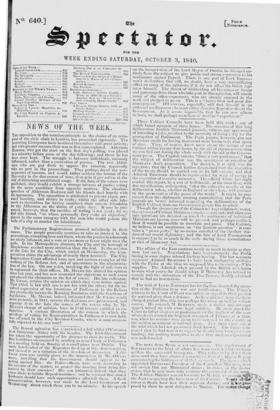The Parliamentary Re g istrations proceed noiselessly in their course. The people
generally continue to take no interest in the proceedings, excepting here and there, where the parties in a borough are nicely balanced, and a vote or two more or fewer might turn the scale. In the Metropolitan districts the City and the borough of Marylebone excited more attention dam the rest. In the revision of the lists for the City, which ended on Wednesday, the Con- servatives claim the advantage of nearly three hundred. The City Registration Court afforded some new and curious examples of the working of the Reform Act, and of uncertainty in the administra- tion of the law. On one point, involving the right of' solicitors to be registered for their offices, Mr. Myeaus has altered his opinion since last year, and has now overruled the objections to such cases and placed the claimants on the list of voters. His late colleague, Mr. CRAIG, retains the opinion on which they were betbre agreed. That which is law with one is not law with the other; for the in- volved expression of the intentions of Parliament in the Refbrin Act practically invests the Revising Barristers with the functions of legislators. Mr. Myi.sia, indeed, intimated that Mr. Cu.sto would most probably, in 1841, reverse the decisions now pronounced, and expunge front the lists the names of the voters who, by Mr. Msssa's change of' opinion, have in 1840 become entitled to the franchise. A- curious illustration of the esteem in which the privilege of voting fbr Representatives in Parliament is now held, was affIrded in the City Revision Courts, where a man success- fully objected to his men vote!


























